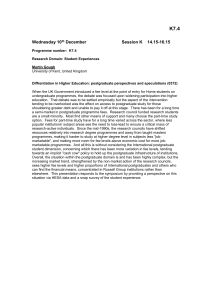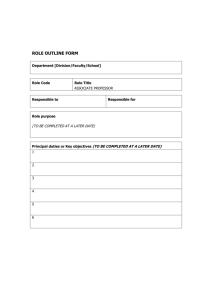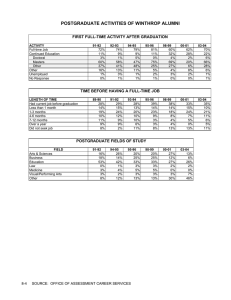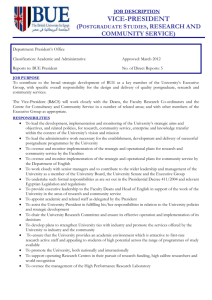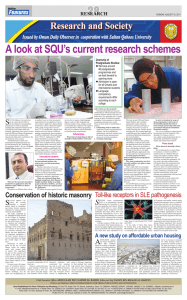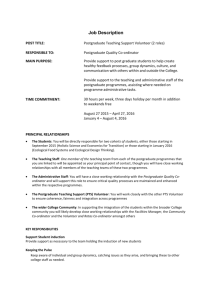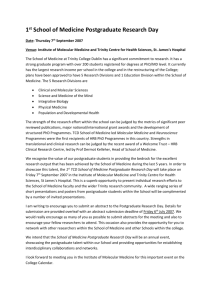26 T The Deanship of Postgraduate
advertisement
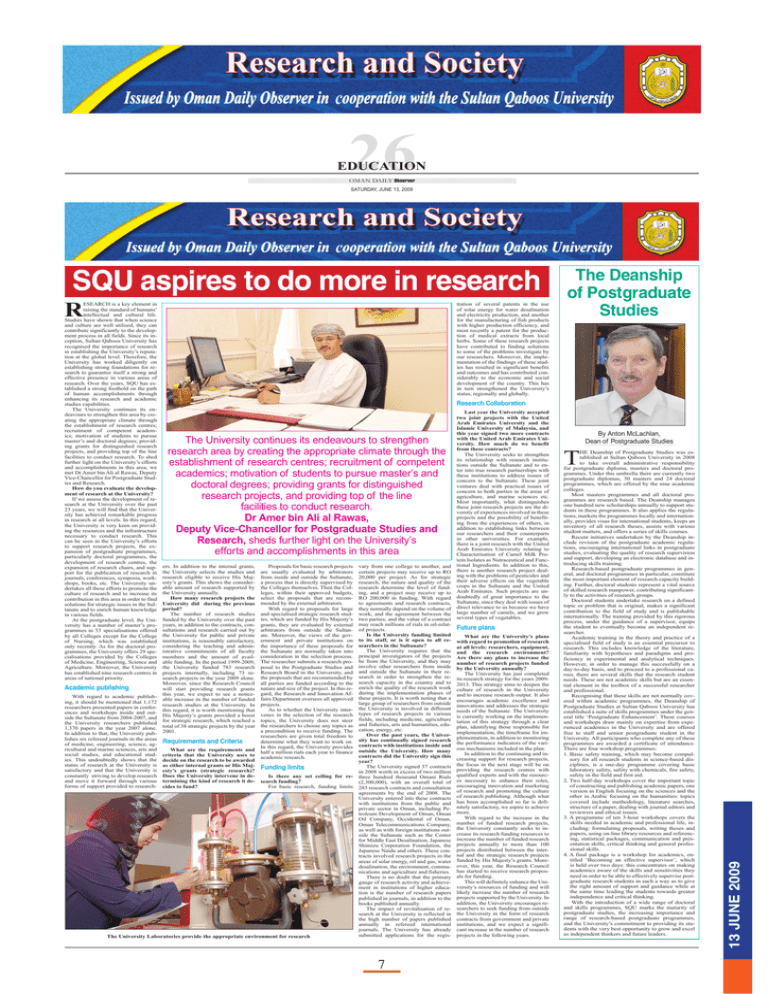
26 EDUCATION OMAN DAILY Observer SATURDAY, JUNE 13, 2009 SQU aspires to do more in research R Academic publishing With regard to academic publishing, it should be mentioned that 1,172 researchers presented papers in conferences and workshops inside and outside the Sultanate from 2004-2007, and the University researchers published 1,370 papers in the year 2007 alone. In addition to that, the University publishes six refereed journals in the areas of medicine, engineering, science, agricultural and marine sciences, arts and social studies, and educational studies. This undoubtedly shows that the status of research at the University is satisfactory and that the University is constantly striving to develop research and move it forward through various forms of support provided to research- tration of several patents in the use of solar energy for water desalination and electricity production, and another for the manufacturing of fish products with higher production efficiency, and most recently a patent for the production of medical extracts from local herbs. Some of these research projects have contributed to finding solutions to some of the problems investigate by our researchers. Moreover, the implementation of the findings of these studies has resulted in significant benefits and outcomes and has contributed considerably to the economic and social development of the country. This has in turn strengthened the University’s status, regionally and globally. Research Collaboration The University continues its endeavours to strengthen research area by creating the appropriate climate through the establishment of research centres; recruitment of competent academics; motivation of students to pursue master’s and doctoral degrees; providing grants for distinguished research projects, and providing top of the line facilities to conduct research. Dr Amer bin Ali al Rawas, Deputy Vice-Chancellor for Postgraduate Studies and Research, sheds further light on the University’s efforts and accomplishments in this area ers. In addition to the internal grants, the University selects the studies and research eligible to receive His Majesty’s grants. This shows the considerable amount of research supported by the University annually. How many research projects the University did during the previous period? The number of research studies funded by the University over the past years, in addition to the contracts, consultations and research carried out by the University for public and private institutions, is reasonably satisfactory, considering the teaching and administrative commitments of all faculty members and the amount of available funding. In the period 1999-2009, the University funded 783 research projects internally, including 73 research projects in the year 2009 alone. Moreover, since the Research Council will start providing research grants this year, we expect to see a noticeable increase in the number of funded research studies at the University. In this regard, it is worth mentioning that His Majesty’s grants provided a boost for strategic research, which reached a total of 38 strategic projects by the year 2001. Requirements and Criteria What are the requirements and criteria that the University uses to decide on the research to be awarded as either internal grants or His Majesty’s grants (strategic research)? Does the University intervene in determining the kind of research it decides to fund? Proposals for basic research projects are usually evaluated by arbitrators from inside and outside the Sultanate, a process that is directly supervised by the Colleges themselves. Then the Colleges, within their approved budgets, select the proposals that are recommended by the external arbitrators. With regard to proposals for large and specialised strategic research studies, which are funded by His Majesty’s grants, they are evaluated by external arbitrators from outside the Sultanate. Moreover, the views of the government and private institutions on the importance of these proposals for the Sultanate are normally taken into consideration in the selection process. The researcher submits a research proposal to the Postgraduate Studies and Research Board in the University, and the proposals that are recommended by all parties are funded according to the nature and size of the project. In this regard, the Research and Innovation Affairs Department oversees all approved projects. As to whether the University intervenes in the selection of the research topics, the University does not steer the researchers to choose any topics as a precondition to receive funding. The researchers are given total freedom to determine what they want to work on. In this regard, the University provides half a million rials each year to finance academic research. Funding limits Is there any set ceiling for research funding? For basic research, funding limits The University Laboratories provide the appropriate environment for research vary from one college to another, and certain projects may receive up to RO 20,000 per project. As for strategic research, the nature and quality of the research determine the level of funding, and a project may receive up to RO 200,000 in funding. With regard to agreements and research contracts, they normally depend on the volume of work; and the agreement between the two parties; and the value of a contract may reach millions of rials in oil-related projects. Is the University funding limited to its staff, or is it open to all researchers in the Sultanate? The University requires that the principal investigators of the projects be from the University, and they may involve other researchers from inside and outside the Sultanate in their research in order to strengthen the research capacity in the country and to enrich the quality of the research work during the implementation phases of these projects. It is worth noting that a large group of researchers from outside the University is involved in different types of research projects in various fields, including medicine, agriculture and fisheries, arts and humanities, education, energy, etc. Over the past years, the University has continually signed research contracts with institutions inside and outside the University. How many contracts did the University sign this year? The University signed 37 contracts in 2008 worth in excess of two million three hundred thousand Omani Rials (2,300,000), with an overall total of 285 research contracts and consultation agreements by the end of 2008. The University entered into these contracts with institutions from the public and private sector in Oman, including Petroleum Development of Oman, Oman Oil Company, Occidental of Oman, Oman Telecommunications Company, as well as with foreign institutions outside the Sultanate such as the Center for Middle East Desalination, Japanese Shimizu Corporation Foundation, the Japanese Naidu and others. These contracts involved research projects in the areas of solar energy, oil and gas, water desalination, the environment, communications and agriculture and fisheries. There is no doubt that the primary gauge of research activity and achievement in institutions of higher education is the number of research papers published in journals, in addition to the books published annually. The impact of revitalisation of research at the University is reflected in the high number of papers published annually in refereed international journals. The University has already submitted applications for the regis- 7 Last year the University accepted two joint projects with the United Arab Emirates University and the Islamic University of Malaysia, and this year signed two more contracts with the United Arab Emirates University. How much do we benefit from these contracts? The University seeks to strengthen its relationship with research institutions outside the Sultanate and to enter into true research partnerships with these institutions to address issues of concern to the Sultanate. These joint ventures deal with practical issues of concern to both parties in the areas of agriculture, and marine sciences etc. Most importantly, what distinguishes these joint research projects are the diversity of experiences involved in these projects and the possibility of benefiting from the experiences of others, in addition to establishing links between our researchers and their counterparts in other universities. For example, there is a joint research with the United Arab Emirates University relating to Characterisation of Camel Milk Protein Isolates as Nutraceutical and Functional Ingredients. In addition to this, there is another research project dealing with the problems of pesticides and their adverse effects on the vegetable crops in the Sultanate and the United Arab Emirates. Such projects are undoubtedly of great importance to the Sultanate, since they deal with issues of direct relevance to us because we have large number of camels, and we grow several types of vegetables. Future plans What are the University’s plans with regard to promotion of research at all levels: researchers, equipment, and the research environment? Are there any plans to increase the number of research projects funded by the University annually? The University has just completed its research strategy for the years 20092013. This strategy aims to deepen the culture of research in the University and to increase research output. It also encourages academic excellence and innovations and addresses the strategic needs of the Sultanate. The University is currently working on the implementation of this strategy through a clear plan, identifying those responsible for implementation, the timeframe for implementation, in addition to monitoring the performance indicators of the various mechanisms included in the plan. In addition to the continuing and increasing support for research projects, the focus in the next stage will be on providing the research centres with qualified experts and with the resources necessary to enhance their roles, encouraging innovation and marketing of research and promoting the culture of research publishing. Although what has been accomplished so far is definitely satisfactory, we aspire to achieve more. With regard to the increase in the number of funded research projects, the University constantly seeks to increase its research funding resources to increase the number of funded research projects annually to more than 100 projects distributed between the internal and the strategic research projects funded by His Majesty’s grants. Moreover, this year, the Research Council has started to receive research proposals for funding. This will definitely enhance the University’s resources of funding and will likely increase the number of research projects supported by the University. In addition, the University encourages researchers to seek funding from outside the University in the form of research contracts from government and private institutions, and we expect a significant increase in the number of research projects in the following years. By Anton McLachlan, Dean of Postgraduate Studies T HE Deanship of Postgraduate Studies was established at Sultan Qaboos University in 2008 to take overall administrative responsibility for postgraduate diploma, masters and doctoral programmes. Under this umbrella there are currently two postgraduate diplomas, 50 masters and 24 doctoral programmes, which are offered by the nine academic colleges. Most masters programmes and all doctoral programmes are research based. The Deanship manages one hundred new scholarships annually to support students in these programmes. It also applies the regulations, markets the programmes locally and internationally, provides visas for international students, keeps an inventory of all research theses, assists with various student matters, and offers a series of skills courses. Recent initiatives undertaken by the Deanship include revision of the postgraduate academic regulations, encouraging international links in postgraduate studies, evaluating the quality of research supervision and support, developing an electronic database and introducing skills training. Research-based postgraduate programmes in general, and doctoral programmes in particular, constitute the most important element of research capacity building. Further, doctoral students represent a vital source of skilled research manpower, contributing significantly to the activities of research groups. Doctoral students undertake research on a defined topic or problem that is original, makes a significant contribution to the field of study and is publishable internationally. The training provided by this rigorous process, under the guidance of a supervisor, equips the student to eventually become an independent researcher. Academic training in the theory and practice of a specialised field of study is an essential precursor to research. This includes knowledge of the literature, familiarity with hypotheses and paradigms and proficiency in experimental and analytical techniques. However, in order to manage this successfully on a day-to-day basis, and to proceed to a professional career, there are several skills that the research student needs. These are not academic skills but are an essential element in the toolbox of a successful researcher and professional. Recognising that these skills are not normally covered within academic programmes, the Deanship of Postgraduate Studies at Sultan Qaboos University has established a suite of skills programmes under the general title ‘Postgraduate Enhancement’. These courses and workshops draw mainly on expertise from experienced academics in the University and are offered free to staff and senior postgraduate student in the University. All participants who complete any of these programmes are awarded a certificate of attendance. There are four workshop programmes: 1. Basic safety training, which may become compulsory for all research students in science-based disciplines, is a one-day programme covering basic laboratory safety, safety with chemicals, fire safety, safety in the field and first aid. 2. Two half-day workshops cover the important topic of constructing and publishing academic papers, one version in English focusing on the sciences and the other in Arabic focusing on the humanities: topics covered include methodology, literature searches, structure of a paper, dealing with journal editors and reviewers and ethical issues. 3. A programme of ten 3-hour workshops covers the skills needed in academic and professional life, including: formulating proposals, writing theses and papers, using on-line library resources and referencing, statistical packages, communication and presentation skills, critical thinking and general professional skills. 4. A final package is a workshop for academics, entitled ‘Becoming an effective supervisor’, which is held over two days: this concentrates on making academics aware of the skills and sensitivities they need in order to be able to effectively supervise postgraduate research students in such a way as to give the right amount of support and guidance while at the same time leading the students towards greater independence and critical thinking. With the introduction of a wide range of doctoral and skills programmes, SQU marks the maturity of postgraduate studies, the increasing importance and range of research-based postgraduate programmes, and the University’s commitment to providing its students with the very best opportunity to grow and excel as independent thinkers and future leaders. 13 JUNE 2009 ESEARCH is a key element in raising the standard of humans’ intellectual and cultural life. Studies have shown that when science and culture are well utilised, they can contribute significantly to the development process in all fields. Since its inception, Sultan Qaboos University has recognised the importance of research in establishing the University’s reputation at the global level. Therefore, the University has worked diligently on establishing strong foundations for research to guarantee itself a strong and effective presence in various areas of research. Over the years, SQU has established a strong foothold on the path of human accomplishments through enhancing its research and academic studies capabilities. The University continues its endeavours to strengthen this area by creating the appropriate climate through the establishment of research centres; recruitment of competent academics; motivation of students to pursue master’s and doctoral degrees; providing grants for distinguished research projects, and providing top of the line facilities to conduct research. To shed further light on the University’s efforts and accomplishments in this area, we met Dr Amer bin Ali al Rawas, Deputy Vice-Chancellor for Postgraduate Studies and Research. How do you evaluate the development of research at the University? If we assess the development of research at the University over the past 23 years, we will find that the University has achieved remarkable progress in research at all levels. In this regard, the University is very keen on providing the resources and the infrastructure necessary to conduct research. This can be seen in the University’s efforts to support research projects, the expansion of postgraduate programmes, particularly doctoral programmes, the development of research centres, the expansion of research chairs, and support for the publication of research in journals, conferences, symposia, workshops, books, etc. The University undertakes all these efforts to promote the culture of research and to increase its contribution in this area in order to find solutions for strategic issues in the Sultanate and to enrich human knowledge in various fields. At the postgraduate level, the University has a number of master’s programmes in 53 specialisations offered by all Colleges except for the College of Nursing, which was established only recently. As for the doctoral programmes, the University offers 29 specialisations provided by the Colleges of Medicine, Engineering, Science and Agriculture. Moreover, the University has established nine research centres in areas of national priority. The Deanship of Postgraduate Studies
